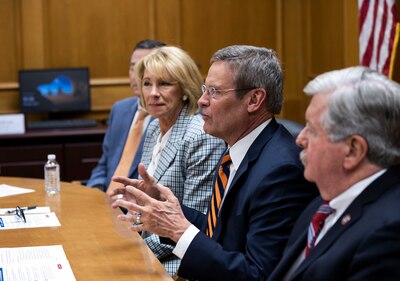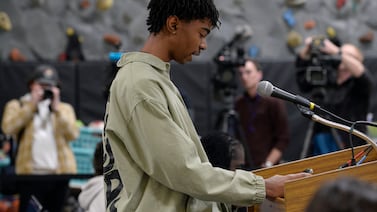One day after Tennessee launched its year-long review to update how history is taught in public schools, Gov. Bill Lee said students should learn that the Jan. 6, 2021, attack on the U.S. Capitol was a day of “lawlessness.”
But he dismissed the U.S. House select committee’s investigation into the events leading up to the deadly riot and potential future threats to election integrity.
“I think that the commission itself is, in large part, a big distraction from what’s going on in this country right now,” said the Republican governor, who has championed civics education and praised teaching about American exceptionalism.
“I think we should be a little more focused, as I am, about what’s happening today in America,” he said Tuesday in response to reporters’ questions.
His comments came just hours before the Jan. 6 committee convened its fourth round of hearings and a day after Tennessee launched its once-every-six-years review of academic standards for teaching social studies, which outline not only key historical facts and information but also concepts about government, politics, economics, and culture.
Tennessee has one of the nation’s most comprehensive processes for reviewing academic standards, including two rounds of public feedback and consideration by multiple committees of educators under the oversight of the State Board of Education.
But Lee and state lawmakers have moved aggressively in recent years to shape the way civics and history are taught in Tennessee schools — mandating more Black history coursework, for example, but also limiting what schools can teach about the origins and persistence of white privilege and unconscious bias. Some critics worry the approach will make schools water down, distort, or even scuttle lessons about important but controversial topics in history.
The history of the Jan. 6 riot is still being written, with former President Donald Trump’s most ardent supporters and some Republicans attempting to downplay or deny the attack. Meanwhile, members of the congressional investigative committee hope the hearings will refocus Americans’ attention on what they have concluded was an unprecedented plot, egged on by Trump, to keep him in power and undermine democracy.
In recent weeks, the committee has heard testimony and presented evidence on how a mob of Trump supporters overran the Capitol, attacked police, and threatened lawmakers and Vice President Mike Pence after he refused Trump’s directive to overturn the results of the 2020 election.
But Lee directed his criticism Tuesday at people who attacked the Capitol, rather than other individuals involved in the broader plot to disrupt the transfer of power.

“Lawlessness is what occurred there and it should be dealt [with] that way and it has been,” Lee told reporters. “And people have been investigated and arrested through the court system.”
Numerous polls show that amid a torrent of misinformation, Americans still don’t agree on basic facts about what led to the riot. And a statewide poll released in May shows that 51% of Tennessee voters regard the insurrection as a legitimate form of protest, while fewer than half believed Biden won the election.
That divide is precisely why a thorough investigation should be done, said Mark Finchum, executive director of the Tennessee Council for the Social Studies, which represents about 400 educators across the state.
“Facts do matter. Telling both sides of the story matters,” Finchum said.
“I think it’s safe to say these hearings will let us know if we really are an exceptional nation,” Finchum added. “If we sweep this under the rug, how are we different from any other country? But if we can speak the truth wherever it leads and make appropriate policy changes, then maybe we are an exceptional country.”
Finchum said many Tennessee teachers are grappling with how to teach about divisive subjects like the insurrection that could get them in hot water with parents or administrators.
“These are questions that I’m sure students are asking,” he said. “You have to be age-appropriate and grade-appropriate. But when you get into upper grades, you’re doing a disservice if you don’t cover it.”
Finchum also emphasized the importance of media literacy to help students separate facts from propaganda.
“We don’t teach that very well in Tennessee,” he said. “I would like to see teachers encourage their students to listen to different perspectives and learn to differentiate a balanced source and a biased source.”
Marta W. Aldrich is a senior correspondent and covers the statehouse for Chalkbeat Tennessee. Contact her at maldrich@chalkbeat.org.





